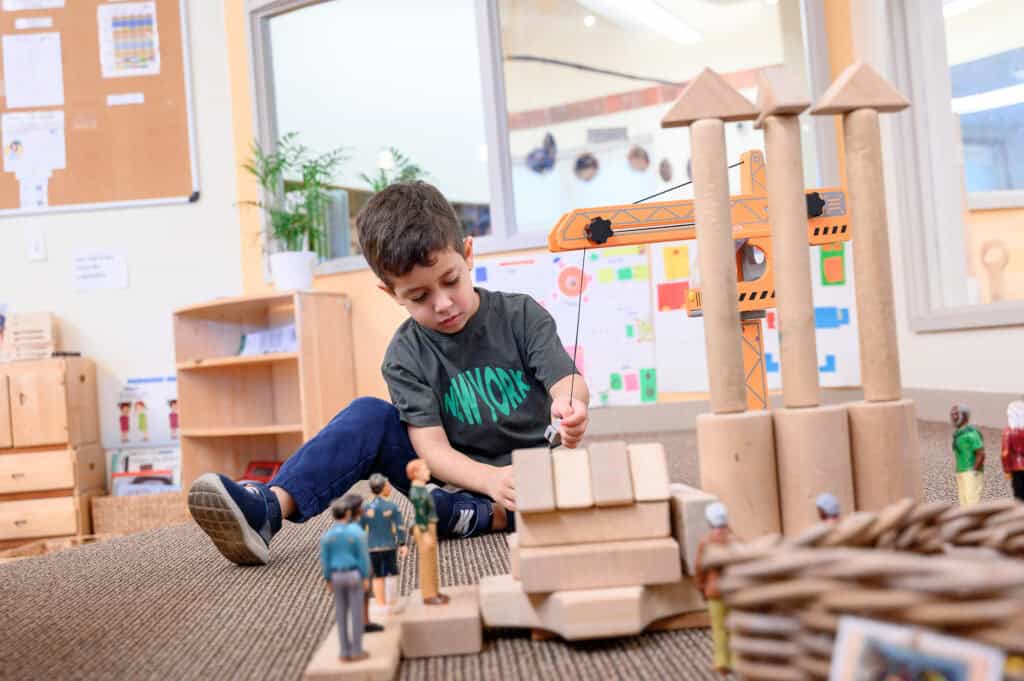Exploration in the Classroom
Research shows that young children learn best through physical (“hands-on”) and mental (“minds-on”) collaborative learning experiences. At 14 schools across the national Educare Network, preschool teachers are participating in Science Club, a bite-sized professional development opportunity that supports them in creating these experiences.
About Science Club
Here’s how it works: Teachers receive a Science Club box every month with open-ended materials and an inquiry guide to spark their thinking on how they can use the materials with their students. Funded by General Motors (GM), the project materials have focused on transportation topics including model vehicles, wheels and ramps.
Following flexible exploration in their classrooms over several weeks, participating teachers come together in communities of practice to share how their children interacted with the materials and to explore lessons learned. Led by a science coach, teachers are encouraged to reflect on how their students are learning foundational science, technology, engineering and math (or STEM) concepts like cause and effect, systems, structure and patterns.
“What excites us about Science Club is that it provides teachers with STEM learning materials in addition to connecting them with their peers at other Educare schools. That means we’re helping a school like Educare Flint locally, making a meaningful impact.”
With coaching and the support of their peers, teachers are better equipped to leverage science daily in their classrooms.
“Encouraging student curiosity and problem-solving translate[s] into more engaging classroom lessons and a deeper understanding of how to support different learning styles,” Educare New Orleans teacher Ashley Williams shared. “Seeing how students thrive when given the freedom to explore scientific concepts in a fun and engaging way has pushed us to incorporate more open-ended investigations and student-driven projects into our classrooms.”
A Research-Based Framework
Educare Science Club developed from a longstanding partnership with Early Science Initiative (ESI) researchers at the University of Miami. Under the direction of Dr. Daryl Greenfield, the ESI team created – and now teaches – an early science framework that meets teachers where they are, facilitating a flexible approach to bringing science into their classrooms and engaging families to support children’s development at home.
“Research and data are at the core of our program design and implementation,” explains Dr. Silvia Niño, ESI’s post-doctoral researcher. “Research underscores that learning is more meaningful when it occurs within familiar contexts. Recognizing this, we prioritize the integration of children’s culture and context.”
To measure the effectiveness of Science Club, teachers partake in pre- and post-assessments. Past assessments revealed that teachers reported more positive attitudes and comfortability around science, increased applied knowledge, and more frequent engagement of science in everyday classroom contexts (e.g. circle time) at the conclusion of the project.
Beyond Science
Data shows that through science activities, children develop critical thinking skills and expand their math, language and social-emotional skills. For teachers, participating in Science Club helps develop stronger science-related and general teaching practices.
“I value how these experiments allow teachers to share ideas and collaborate on best practices. They are setting an example for children and families, demonstrating the importance of science and inquiry. This fosters a culture of curiosity, exploration and discovery in the classroom.”
Sharing with the Field
At the National Science Teaching Association’s annual conference in November 2024, three Educare teachers and ESI partners presented on Educare’s learnings to the broader educational field.
“The most impactful part … was being able to share ideas and engage with passionate educators from across the country,” Educare New Orleans teacher Jacqueline Turner says. “Being able to contribute to the professional learning community, receive feedback, and discuss innovative teaching strategies was incredibly rewarding.”
Connecting to Network Priorities
Through Science Club and other initiatives, Educare schools are committed to providing children with access to opportunities, starting with their experiences in the classroom. From strengthening language and social-emotional skills to integrating STEM concepts into daily programming, the Network prioritizes quality early learning and care at every turn, and will continue to collaborate with community organizations, partners and corporations to build a future where every child, in every community across the country, thrives.
